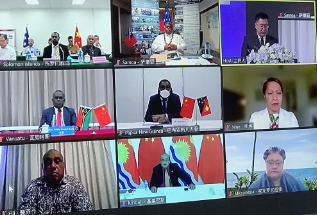It gives me great pleasure to be part of this important session focusing on
fisheries cooperation and development, under the theme of “Opening up New
Prospects for Fisheries Cooperation between the People’s Republic of China and
Pacific Island countries”.
The importance of the Fisheries and Aquaculture sector cannot be over-
emphasized. Fish continues to be one of the most traded food commodities, and
for Samoa, fisheries exports account for a significant value of our traded
commodities. The sector is key for employment opportunities, performs an
irreplaceable role in our food and nutritional security and important to people’s
livelihoods.
There is pressure on coastal fisheries resources due to destructive fishing
practices, and highly efficient fishing technology has led to reduced supply. To a
lesser extent, cyclones and other natural disasters have also contributed to
damage of natural resource habitats. Climate change is also impacting on our
coastal and near-shore fisheries resources.
I wish to recall our Pacific Islands Forum Leaders’ commitment to the
conservation and sustainable management of the ocean and its resources
contained in their Ocean Statement 2020/21.
In particular, Samoa remains committed to ensuring the long-term sustainability
and viability of our Blue Pacific’s fisheries resources currently being
compromised by IUU fishing, climate change, marine plastic pollutions, oil spills
and discharge of waste amongst others. As we well know, the use of plastic in
many sectors necessitates an international global agreement to address marine
litter and plastic pollution, and we reaffirm our support for the Pacific Regional
Declaration on the Prevention of Marine Litter and Plastic Pollution and its
Impacts. I look forward to working closely with all our Pacific governments and
China to responsibly and effectively manage our Blue Pacific Ocean and its
fisheries.
Samoa has great potential for aquaculture development, however investment
and assistance is needed in this area. We see opportunities in collaboration with
China to develop our aquaculture sector in a sustainable manner.
Aquaculture is an important alternative protein source for our people as well as
crucial support to our fisheries management strategies and provides adaptation
to climate change. Under such cooperation we could see;
A well-established Aquaculture Research and Development Center
providing tools and services including research and training for
farmers and fishers
Improved hatchery facilities to enhance nursery productions of both
freshwater and mari-culture of potential commodities;
Provide aquaculture experts to work and train our local fisheries
staff; and,
Increase aquaculture production and marketing potential in Samoa
including scoping for commercialisation
Samoa offers potential as a regional hub for the fishing industry given also its
central location.
With cooperation for investment, we may be able to establish an on-shore
processing facility for fish products to overseas markets and to be located closely
to ports such as that on the western side of Savaii.
Samoa’s Ministry of Agriculture and Fisheries and China’s General
Administration of Customs signed a Memorandum of Understanding (MOU) in
2019 on inspection, quarantine and veterinary sanitary requirements for wild
marine fishing aquatic products to be exported from Samoa to China. With the
establishment now of Samoa’s Seafood Safety and Verification Unit, or
Competent Authority, we would like to explore potential investment and
development opportunities that would facilitate access for our fish and fishery
products to China under the 2019 MOU between our Ministry and the Ministry of
Agriculture and Rural Affairs of China.
With today’s technological advancements and improved research capabilities in
the field of aquaculture, there is potential for Samoa to increase its fisheries
production. We look forward to working closely with China in developing specific
capacity building and training opportunities in aquaculture and other areas of
fisheries to ensure sustainable and quality development of our fishery sector.
Continued and deepened engagement and partnerships would be particularly
important in our efforts to build back better post-COVID-19.
Thank you for your attention and God bless!

